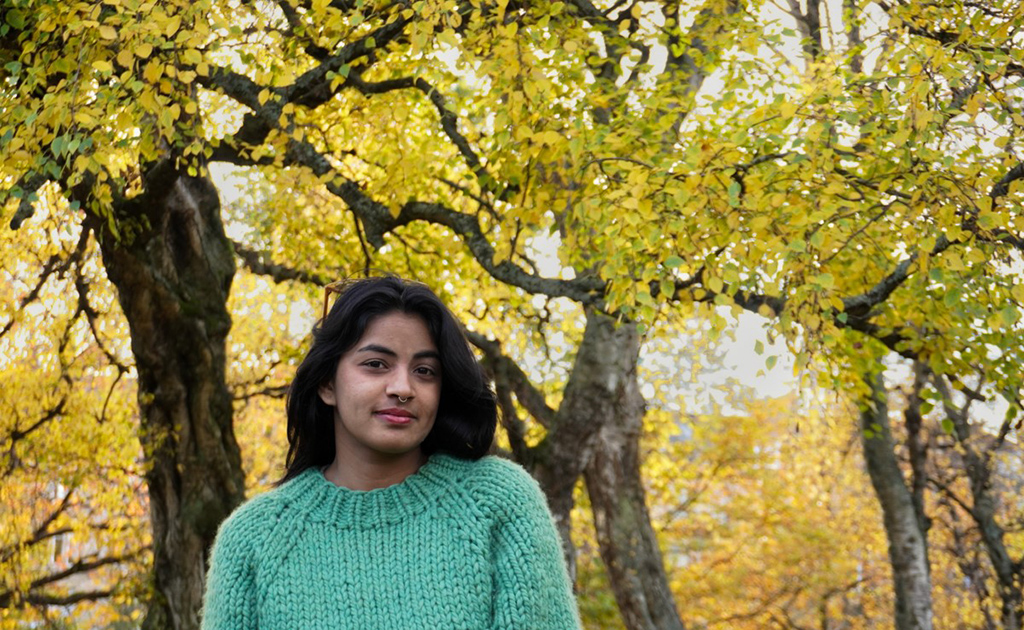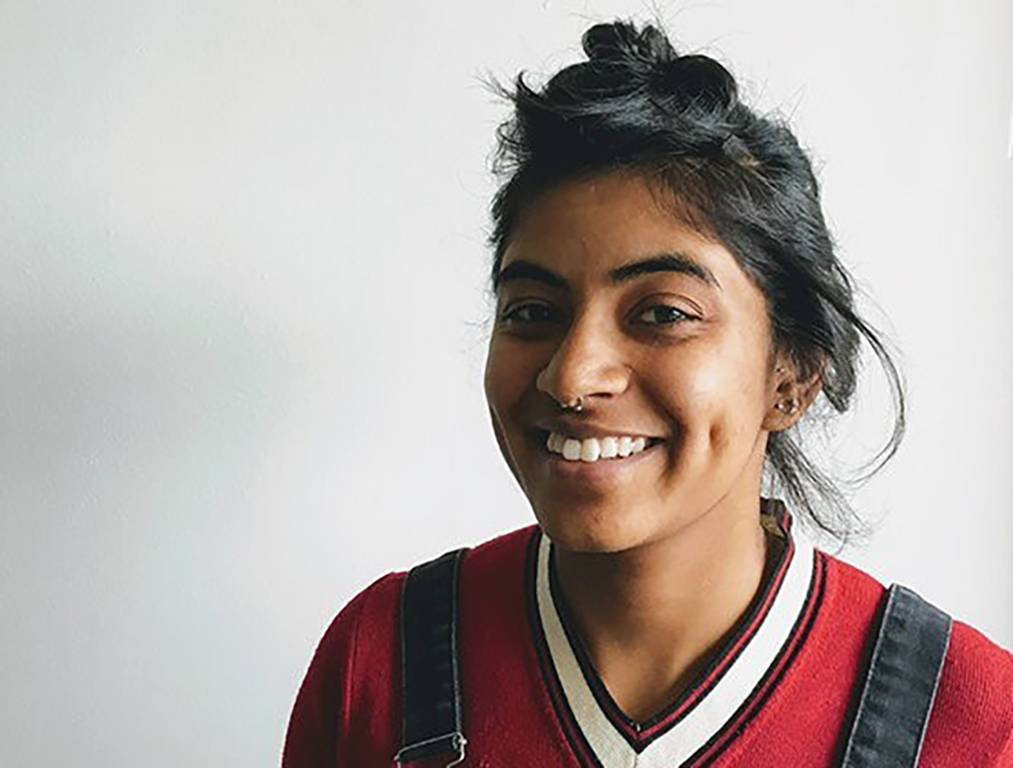Shalaka Jadhav took a moment to reflect near the end of a second hectic week of the United Nations COP26 summit in Scotland. On Thursday we found a quiet spot in Glasgow’s Kelvingrove Park, watched dogs run by, and discussed the power youth can exercise as the climate emergency mounts — even though such global gatherings are designed to diminish their role.
Jadhav grew up in India and Dubai before moving to Ontario. Trained as an urban planner and curator of collaborations, they are design and community manager at Youth Climate Lab, which four years ago rose out of the need for young people to develop the skills necessary to step into spaces of power. Canada-based YCL has gone on to work with more than 30 partners around the world to launch projects reaching thousands of young people in more than 77 countries, says the non-profit’s website.
Now Jadhav and team members are on the ground at COP26, using their skills to advocate for systems change. The time here has provided frustrations. Jadhav was troubled by the outsized presence of the fossil fuels lobby at the gathering, and “states fighting for their own personal interests.” But far from burnt out, YCL members were energized in their mission of supporting young people on their journeys to advocate for climate justice, Jadhav told us. “COP is just the beginning of the work.”
Here is our conversation, edited and condensed for clarity.
The Tyee: You have been at COP26 learning, listening and speaking truth in the halls of power for the past two weeks. Have you also found here collective care and joy?
I feel like collective care and joy create spaces that can start these very powerful movements. This is something we have seen in the work of the Indigenous Peoples’ Caucus, in terms of how these values have been orienting their strategy and vision, driving their work back towards a fundamental relationship with the land.
In some ways I have seen that at COP26, but in others not at all. It’s definitely not present under the structure or the formula of the conference.
But, outside the official negotiation areas, these spaces of collective care and joy have come up more organically — whether it's running into familiar faces and getting excited, or finding a space to sort of decompress. But I would say, as a designer, I don't feel like I've seen spaces intentionally designed for that.
Informally, I've seen it. Formally, by design, I've really struggled to see it. And, given that it’s my first and only COP, I can’t help but feel like that’s intentional.
Responding to climate change necessarily will require collectivism and community. Is that a major topic on the table at the COP proceedings?
I’ve been feeling very much like the narrative of individualism has been constantly reinforced — specifically, the narrative that individual action is what’s going to get us out of this. But I think the moment the truth really clicked in for me, was when I saw some statistics about the presence of the fossil fuel industry at COP26.
If the fossil fuel industry was its own cohesive delegation, it would be the largest one at COP. They outnumber Indigenous representatives fully two to one.
The issue of climate change is so deeply tied to land and yet, in the year 2021, the biggest group at COP is the extractive fossil fuel industry. It just doesn't quite make sense, does it?
People might put forth the argument that we need everyone on board, but is this really the way that we need everyone on board? Especially considering the power dynamics inherent in the fossil fuel industry, are there not more effective and thoughtful ways to facilitate these conversations?
At the end of the day, we are talking about states fighting for their own personal interests. And it’s really important to be critical of that framework, because ultimately that's going to encourage a sort of individualism at every level of action.
We’ve seen criticisms that fossil fuel industries have come to the conference to engage in greenwashing their reputations. Are you seeing something similar with youth tokenization, or "youth-washing"?
I'm just starting to get familiar with this terminology of youth-washing. At Youth Climate Lab we see it all the time, and we have tools to ensure that young people recognize the signs when it's happening.
Some of that can look like: not being paid, or being asked to work unreasonable hours. Or not feeling like you're representing your own voice but rather representing the voice of an organization, or being heavily trained to speak in certain curated messages.
In terms of greenwashing you have to ask yourself: who is this messaging for? Why is it placed in this strategic way? And what does this mean going forward?
We read a recent post on Youth Climate Lab social that spoke to the need to give permission to young people to feel like it's okay to not be doing public work the whole time while they're here. It highlighted the importance of rest from the trauma and pressure of the space.
I am a young person holding a lot of climate grief. I also feel accountable to the treaties and territories that host the members of Youth Climate Lab. [Jadhav’s YCL bio says they now hail from Block 2 of the Haldimand Tract.]
So I feel a lot of pressure in terms of taking up space that someone else may not have been able to.

I think leaning into community care and not subscribing to guilt is important. Because to me, it's not a particularly productive feeling. When you feel guilty, you're just kind of sitting in feelings of shame. And I really encourage people to think about moving that guilt and shamefulness into a space of reflection.
It doesn't need to be “What can I do to move through this?” But it could look like, “What worldviews do I need to challenge in my life, in order to move me to a place that allows me to not only care for myself, but my community as well?” That is actually, in terms of infrastructure, really important for movement building.
What lessons are you bringing home to your community and to Youth Climate Lab?
I’ve seen that every state actor does their negotiations differently, based on a number of different variables, but you will note that a lot of the negotiating teams probably don't have a lot of young people on them.
In 2017, we started working with the country of Seychelles to help them build up the capacity of their young negotiators. Eventually, we built out the Seychelles-SYAH Support Team or SST which was a mix of Seychellois youth and non- Seychellois youth. This work helped to guide young negotiators through basic training on concepts like the organization of the United Nations Framework Convention on Climate Change, the language of legal negotiation and other technical pieces, because these concepts are inaccessible to most young people.
And so the roots of Youth Climate Lab were really a response to the existing gap in capacity-building for youth within international spaces.
At COP26, we are revisiting that state of affairs a little bit, and we are noticing that all of this is basically still true. Young people are still struggling, and are facing so many barriers to entering spaces of international decision-making.
As an organization headquartered in the Global North, we ask: what can we do to pull together capacity-building resources and focus on the necessary training work to address this gap?
We're also looking forward to continuing the work around the climate finance letter that our associates from the Climate Resilience Collective in the Bay of Bengal put together. Bangladesh is incredibly climate vulnerable, and we had a program where a lot of locals worked on connecting their lived experience to climate, and realizing it at the stage of climate finance.
We will be preparing and getting endorsements for the next COP, which is being held in Egypt. And so now that it's not in Europe, there can be a pretty different sort of agenda setting. We're really looking forward to finance continuing to be a really big point of conversation.
We're also realizing that there might be a skills gap in the technical tools that young people need to tell these stories. You know, a lot of people are really good at telling them, but maybe there's a bit of a gap to fill around different ways to tell them, whether it's through film or photo stories.
What is inspiring you right now at COP26 and in this current moment?
Yesterday I sat in on an informal global stock-taking plenary. During a global stock-take, all the ministers from different state actors will come together and talk about their climate commitments. It's really interesting, because it's very connected to how they will actually carry out their Nationally Determined Contributions to reducing their greenhouse gas emissions.
At first I did go in there with a lot of cynicism, because I was seeing a lot of tokenism, competitiveness and also states not being on the same page about the kinds of priorities and methodologies we need to get to certain places. But as I stayed a little longer, I heard a few ministers start to talk about how, globally, a lot of countries seem to actually be approaching the same page. And that gave me at least a little bit of hope about what we might be able to accomplish on the international stage.
And I will say this: part of the reason I wanted to enter that official space with hope — despite feeling instinctively cynical — was because of the lessons that have been shared with me surrounding care and joy. I have learned from Indigenous activists and from youth, who have really been leading on this, that you can’t do this work from a bad place. You really need to come to it in a good way, keeping in mind that everyone has a different relationship to what that "good" way really is.
On that note, what is really giving me excitement is witnessing the strength of Indigenous youth and activists here. You know, they continue to be on the frontlines of this work all around the world, and seeing their solidarity across borders has really felt inspiring. In my small way, I hope to move forward those lessons. ![]()
Read more: Rights + Justice, Environment

















Tyee Commenting Guidelines
Comments that violate guidelines risk being deleted, and violations may result in a temporary or permanent user ban. Maintain the spirit of good conversation to stay in the discussion.
*Please note The Tyee is not a forum for spreading misinformation about COVID-19, denying its existence or minimizing its risk to public health.
Do:
Do not: